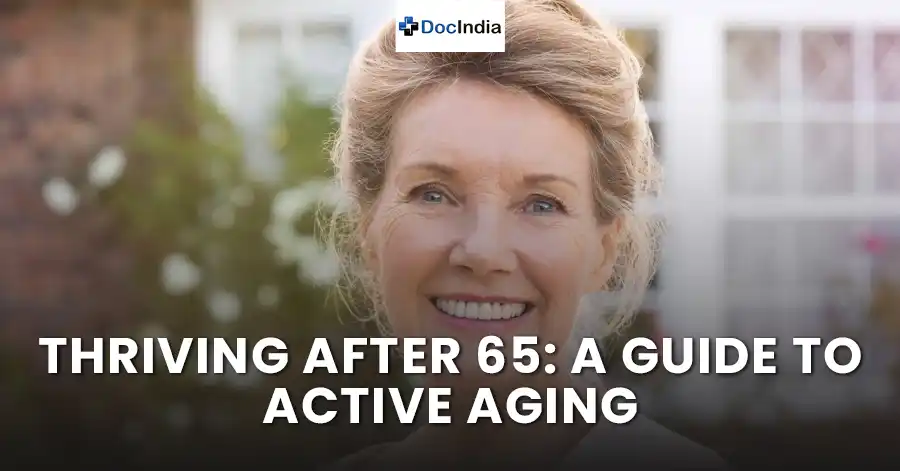Thriving After 65: A Guide to Active Aging

How to stay active after 65: Wellness tips for senior citizens
Keeping up an active and healthy lifestyle becomes more crucial for general wellbeing as we get older. Being physically active is important for people over 65, but it's also critical for their mental and emotional wellbeing. We will go over a wide range of wellness advice in this extensive study that is especially designed to help senior citizens lead active and satisfying lives.
The Importance of Physical Activity for Seniors
1. Physical Health Benefits
Regular physical activity has numerous health benefits for seniors. It helps in maintaining a healthy weight, reducing the risk of chronic diseases such as heart disease and diabetes, and improving cardiovascular health. Engaging in physical activities also contributes to better joint flexibility, balance, and muscle strength.
2. Mental and Emotional Well-being
Physical activity is not only essential for the body but also for the mind. Exercise has been linked to cognitive function and can help prevent or manage conditions like dementia and depression. Additionally, staying active promotes a positive mood and reduces stress, contributing to overall mental and emotional well-being.
Tailoring Exercise to Senior Needs
1. Low-Impact Exercises
Seniors should focus on low-impact exercises to protect joints and minimize the risk of injury. Activities like walking, swimming, and cycling are excellent choices. These exercises provide cardiovascular benefits without putting excessive stress on the joints.
2. Strength Training
Including strength training in a senior fitness routine is crucial for maintaining muscle mass and bone density. Simple weightlifting exercises or resistance training with resistance bands can help improve strength and stability, reducing the risk of falls.
3. Flexibility and Balance
Flexibility and balance exercises are essential for seniors to prevent falls and enhance mobility. Activities such as yoga and tai chi are excellent choices as they not only improve flexibility but also focus on balance and coordination.
Making Lifestyle Adjustments
1. Nutrition
A balanced and nutritious diet plays a pivotal role in maintaining overall health. Seniors should focus on a diet rich in fruits, vegetables, lean proteins, and whole grains. Staying hydrated is equally important, as it supports various bodily functions.
2. Adequate Sleep
Quality sleep is vital for seniors' health and well-being. Establishing a regular sleep routine and creating a comfortable sleep environment can contribute to better sleep quality. A good night's sleep supports physical and mental recovery.
3. Regular Health Check-ups
Regular health check-ups are crucial for early detection and management of potential health issues. Seniors should schedule routine visits to their healthcare providers to monitor blood pressure, cholesterol levels, and other key indicators of health.
Social Engagement and Mental Stimulation
1. Social Activities
Staying socially active is essential for mental and emotional well-being. Engaging in social activities, such as joining clubs, participating in community events, or spending time with family and friends, can help combat loneliness and promote a sense of belonging.
2. Mental Stimulation
Keeping the mind active is as important as keeping the body active. Seniors can engage in activities that challenge the brain, such as puzzles, games, or learning new skills. Reading, attending lectures, or taking up a new hobby can also provide mental stimulation.
Adaptive Technologies and Tools
1. Wearable Devices
The use of wearable devices, such as fitness trackers, can help seniors monitor their daily physical activity levels. These devices can provide valuable insights into steps taken, heart rate, and sleep patterns, encouraging seniors to stay active.
2. Home Exercise Equipment
For those who prefer exercising at home, there is a variety of senior-friendly exercise equipment available. This includes resistance bands, dumbbells, and stability balls. Creating a home gym setup can make it more convenient for seniors to incorporate exercise into their daily routine.
Staying active after the age of 65 is not only possible but essential for maintaining a high quality of life. By incorporating a combination of physical activity, healthy lifestyle choices, and social engagement, senior citizens can enjoy improved physical, mental, and emotional well-being. It's never too late to start adopting these wellness tips, and with the right approach, seniors can continue to lead active and fulfilling lives. Remember, the key is finding activities that bring joy and fulfillment while supporting overall health.
